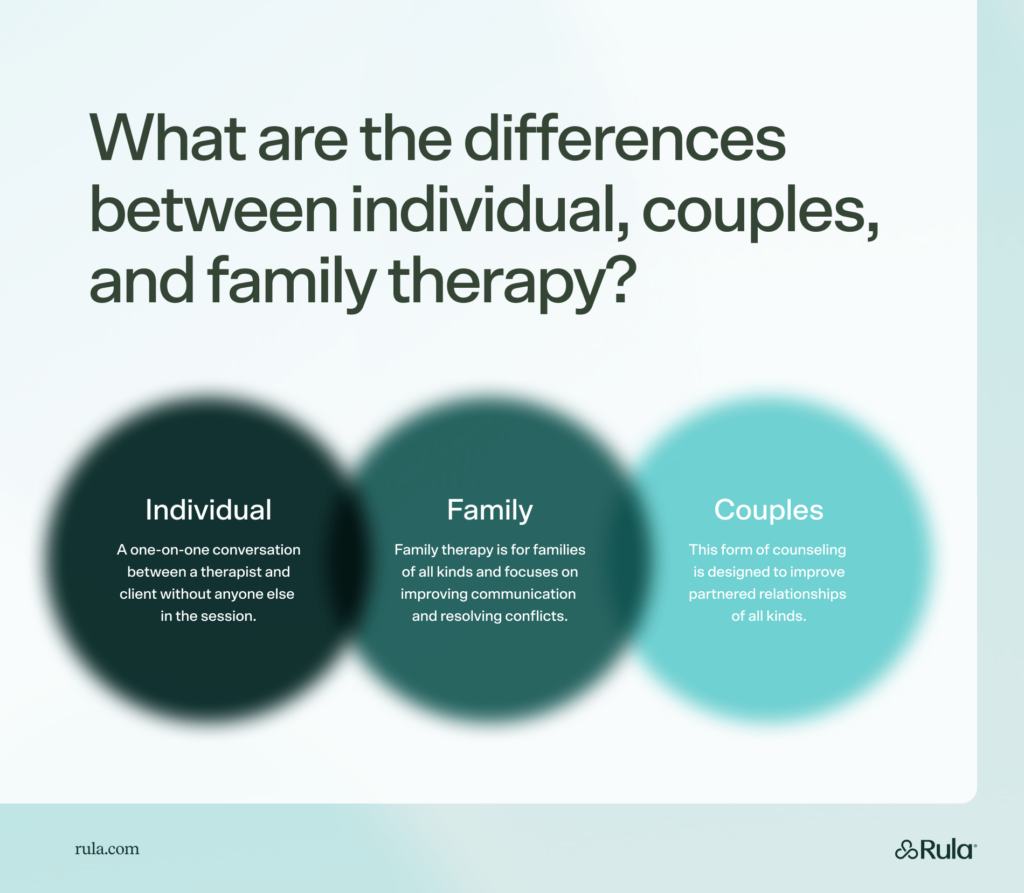Individual, couples, and family therapy each focus on different dynamics and concerns. Many people engage in these different services at the same time.
Your therapeutic needs will likely change over the course of your life. It can be helpful to try different combinations of therapies as your circumstances evolve and new challenges arise.
If you’re new to therapy, individual therapy is a great place to start. From there, you can work with your therapist to determine if it might be helpful for you to engage in couples or family counseling as well.
The three most common types of therapy are individual, couples, and family therapy. But how do you know which one is right for you? When it comes to finding the right form of mental healthcare, sometimes the options can feel a little overwhelming.
For example, perhaps you’re having frequent conflicts with your partner and it’s affecting the entire family dynamic. In that situation, would couples therapy be the best choice? Or should you seek individual counseling to unpack the underlying issues that manifest during those conflicts? But since the conflict is affecting everyone, would family therapy be the best fit?
The answers to these questions will be different for everyone and the type of support you need will likely shift as your situation changes. Many people who seek one type of therapy go on to explore other formats, sometimes accessing multiple types of care at the same time. Learning more about the different types of therapy can help you make an informed and empowered choice.
What are the different types of services therapists offer?
It’s important to understand the different types of therapy that providers offer, so that you can decide what’s the best fit for you and your needs.
Individual
When you hear the term “therapy,” what do you picture? For most people, it’s traditional individual therapy: a one-on-one conversation between a therapist and client without anyone else in the session. This unique dynamic in a confidential, safe space enables personal growth during challenging times.
Couples
Another common form of therapy is couples therapy. While it’s often thought of as a support for traditional, two-person couples, this form of counseling is designed to improve partnered relationships of all kinds. It focuses on problems within and between the individuals that affect the relationship.
Family
Whether connected by biology or choice, the family unit can take many different forms. Family therapy is for families of all kinds and focuses on improving communication and resolving conflicts. By working with all or specific members of the family to enhance understanding and strengthen bonds, family therapy can improve well-being for everyone involved.
Can I do more than one type of therapy?
In a word, yes! Different therapy types can complement each other and provide a more comprehensive approach to addressing your mental health and relationship needs.
As is the case with other types of healthcare, different types of therapy can address different types of mental health concerns concurrently. For example, you might see a physical trainer to improve your range of motion while working with a nutritionist to improve your diet at the same time. These professionals focus on different things but their support can improve your quality of life in complementary ways. Doing multiple types of therapy can offer a similar benefit.
But just because you can access more than one type of therapy doesn’t always mean it’s always the right choice. Participating in more than one type of therapy can be costly, time-consuming, and may require a significant commitment.
The effort you put into therapy extends far beyond the time you spend in sessions with a therapist. You need to give yourself time to process what comes up in those conversations and experiment with new ways of coping and communicating in your daily life. So if you’re considering attending multiple forms of therapy, talk to your therapist and approach this decision thoughtfully.
The care you need, when you need it
Learn how Rula can support your mental health journey
What are the benefits of doing multiple types of therapy?
Therapy is a personal journey, and you have the right to tailor it to meet your needs. Ultimately, the decision to engage in more than one type of care should be based on what you believe will best support your goals.
Having the ability to examine different aspects of your life and your relationships may shed light on cycles and patterns that don’t surface in all settings. Your relationship with your spouse or partner(s) in couples therapy may look different than it does when your whole family is present. So you might use couples or family therapy to focus on improving communication skills and navigating the specific challenges you face with your loved ones. While at the same time, you can attend individual therapy to explore personal issues that may be best suited for a confidential, one-on-one setting.
No matter what combination of therapies you choose, know that with effective treatment planning, improvement in one area of your life can carry over into others.
Here are a few examples:
You might find that improving the connection with your partner(s) positively affects your family dynamics as a whole.
You might find that the insight you gain in individual therapy allows you to have more patience with your partner or children.
Or you might find that feeling supported by all of your loved ones in family therapy has an immensely positive impact on whatever personal challenges you might be facing.
Of course, attending multiple types of therapy isn’t possible or advisable for everyone and that’s okay. You can do meaningful work individually and within your relationships by doing the single form of therapy that feels right for you.
I’m new to therapy. Where should I start?
If you’re new to therapy a great place to start is with individual therapy. Having a safe and confidential space for you to openly discuss your thoughts, feelings, and concerns can help you work towards positive changes in your life.
If the specific challenges you are facing involve other important people in your life directly, like an intimate partner or family member, then it might be helpful to consider combining family and individual counseling. But keep in mind that for couples or family therapy to be effective, everyone involved has to be willing to engage in the process. If your partner(s) or loved ones are hesitant to commit to therapy then individual therapy can still be beneficial for your personal growth.
Find the right combination of therapies with help from Rula
Whether you’re interested in individual, couples or family therapy, Rula is here to make it easier to find the right support.
Rula can match you with a licensed marriage and family therapist (LMFT) who takes your insurance and specializes in the type of treatment you’re looking for. If you’re already seeing a therapist, we can help you find another provider to see at the same time, and ensure your entire care team is able to collaborate effectively. To learn more, check out our website.
Find therapists near you
New York, NY – Houston, TX – Rancho Cucamonga, CA – Austin, TX – Chicago, IL – Los Angeles, CA – Columbus, OH – Portland, OR – Dallas, TX – Jacksonville, FL – Charlotte, NC – Denver, CO – Huntsville, AL – Philadelphia, PA – Seattle, WA – Find your city
Rula's editorial process
Rula's editorial team is on a mission to make science-backed mental health insights accessible and practical for every person seeking to better understand or improve mental wellness.
Members of Rula’s clinical leadership team and other expert providers contribute to all published content, offering guidance on themes and insights based on their firsthand experience in the field. Every piece of content is thoroughly reviewed by a clinician before publishing.




